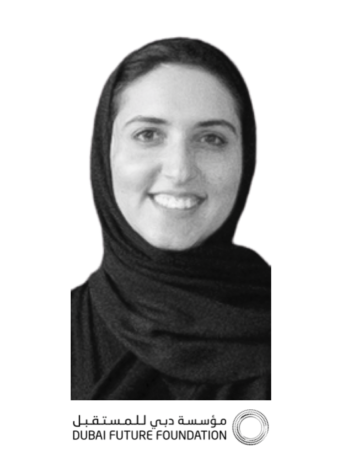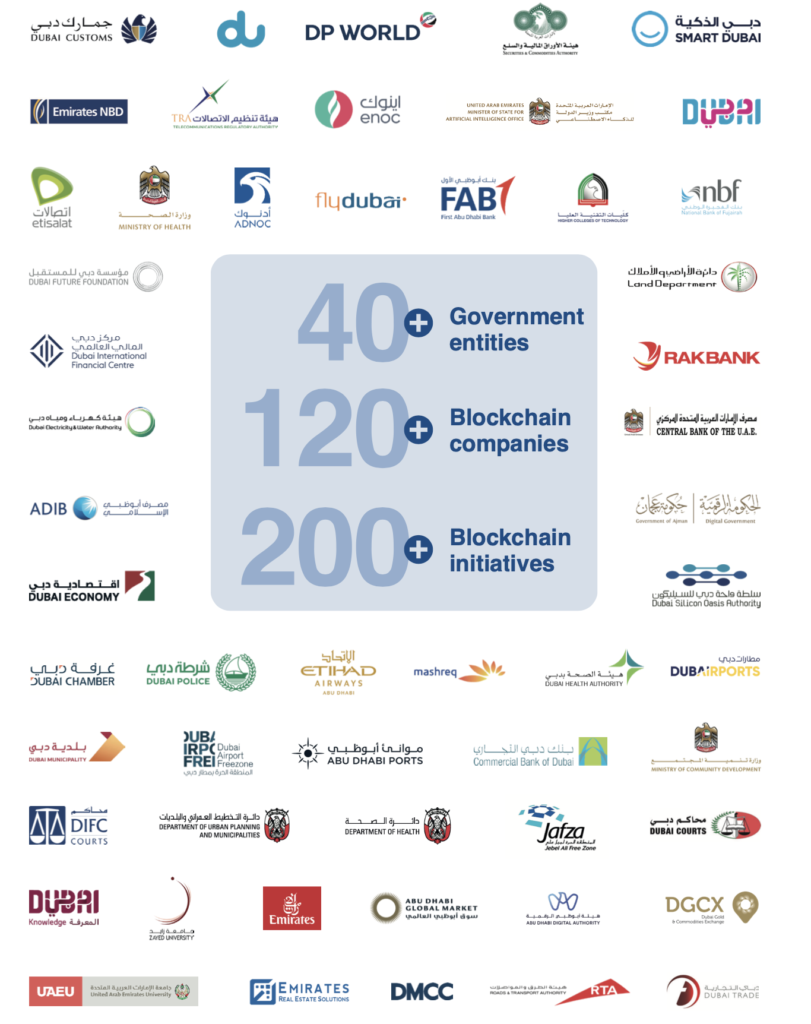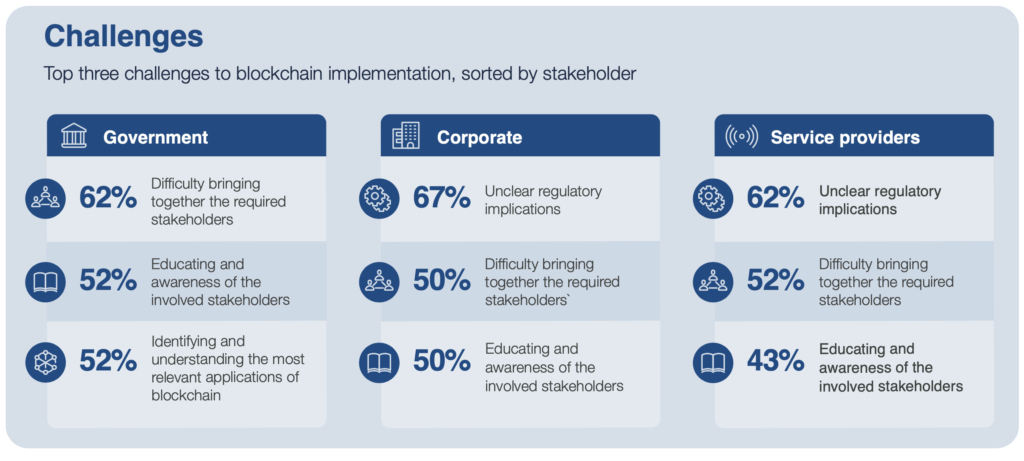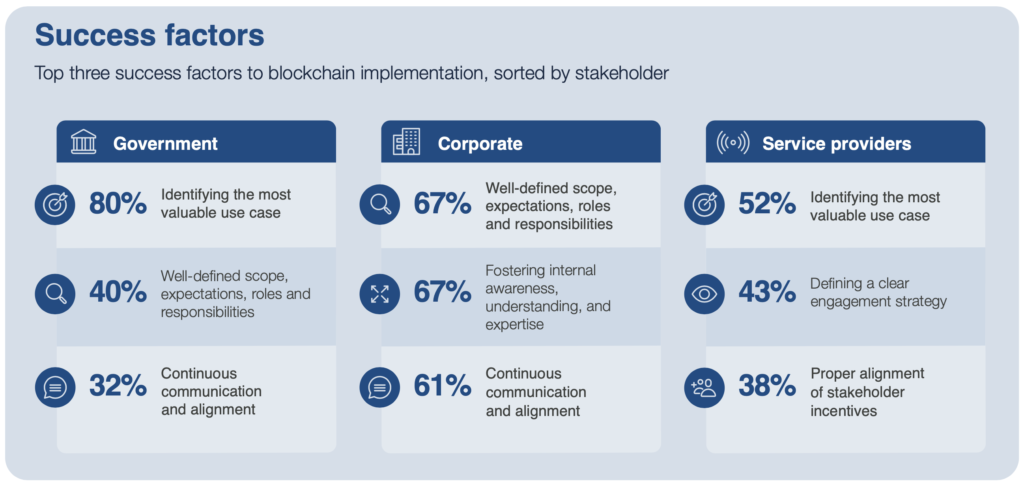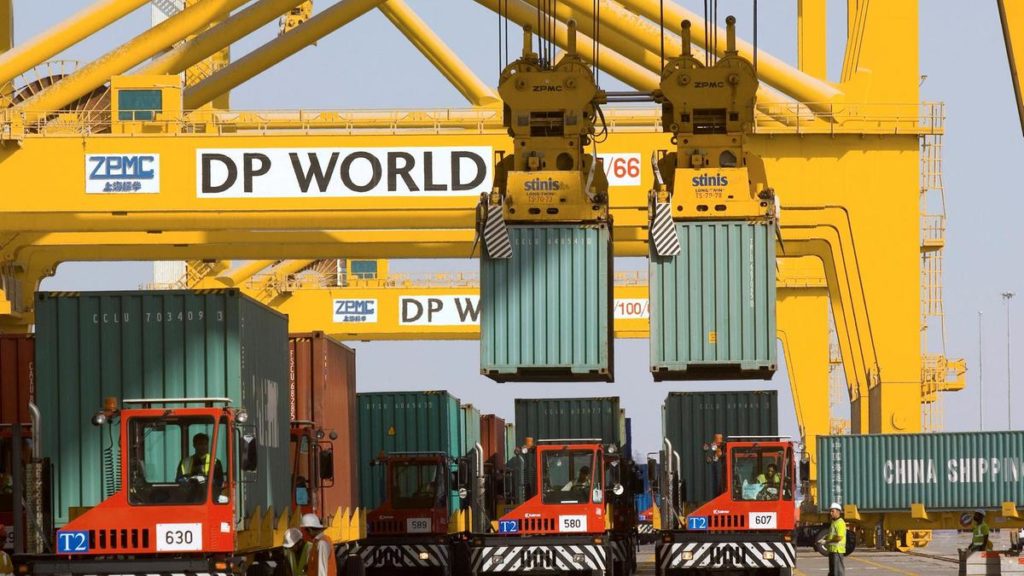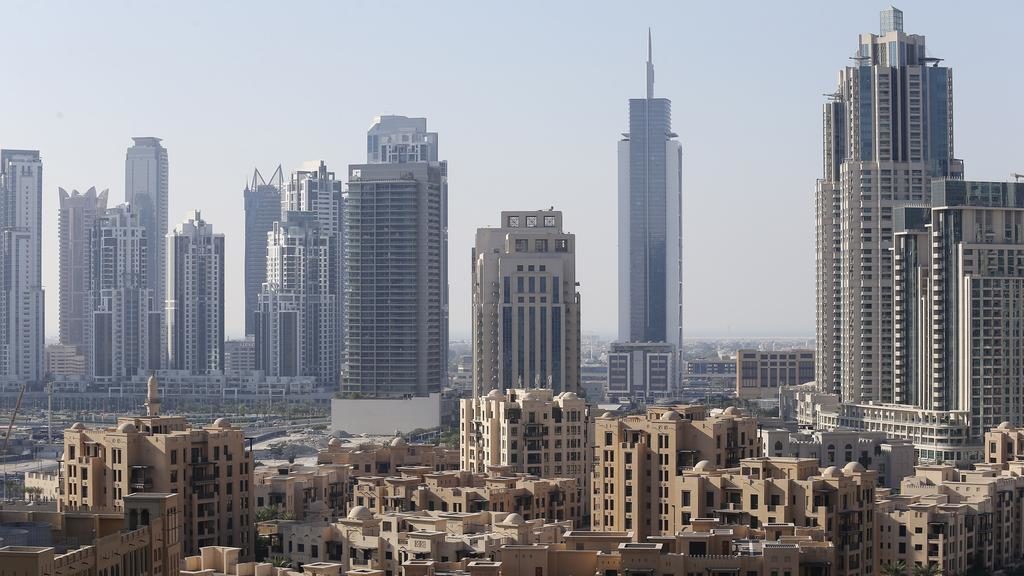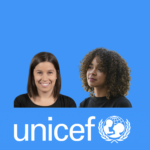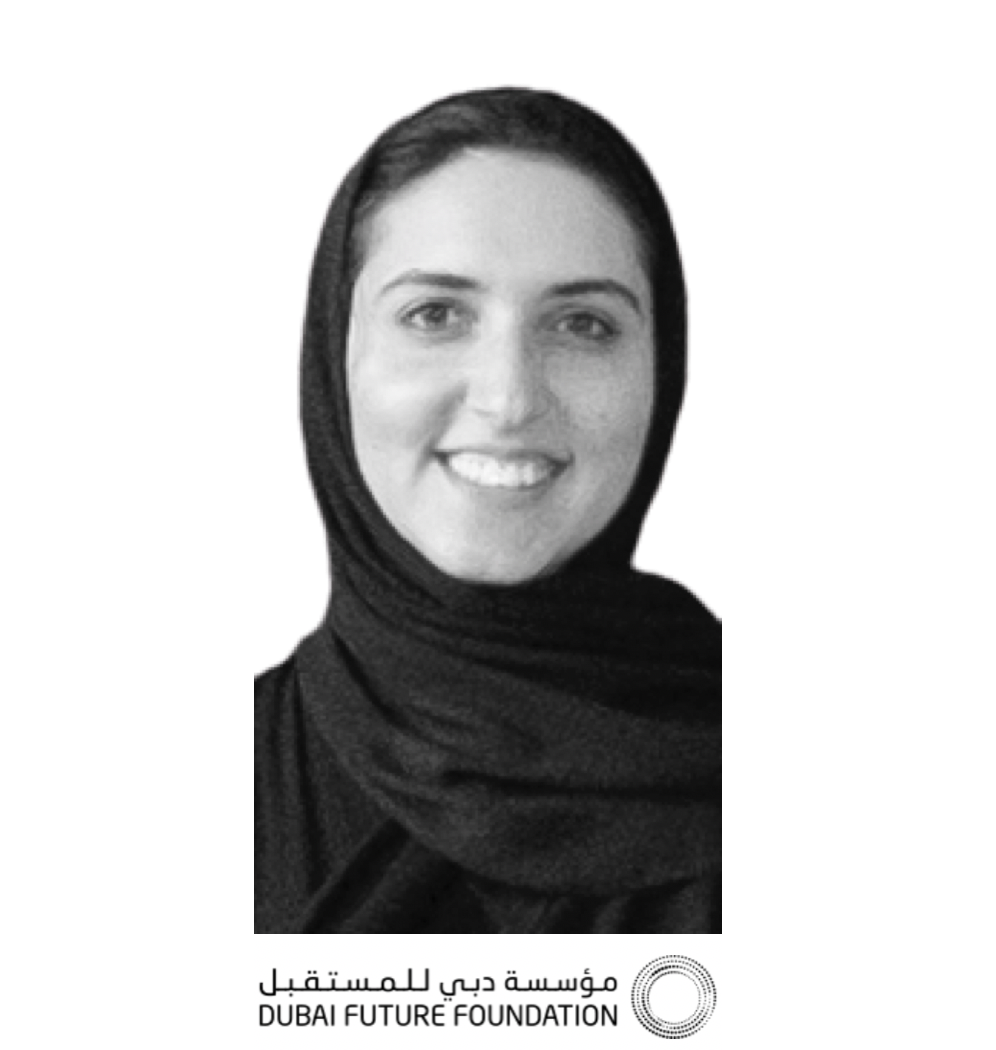
Mariam Al Muhairi is the Head of the UAE’s Centre for the 4th Industrial Revolution and Project Manager at the Dubai Future Foundation. She joins us to discuss the UAE’s blockchain deployment case studies and learnings. She also shares some fascinating results of a survey conducted with over 100 stakeholders from more than 60 various governmental and non-governmental entities across the UAE regarding top blockchain implementation challenges and success factors.
What is blockchain?
Mariam likes to see things in the form of physical blocks. For her blockchain are blocks, identifiable by a unique code, that stores information, and stores who is transacting with the information. Each transaction is verified through a process that involves miners on a public blockchain which creates great security. This ultimately also helps to avoid blocks being tampered and used in a fraudulent manner.
Dubai Future Foundation
The UAE’s Centre for the 4th Industrial Revolution is an initiative under the Dubai Future Foundation. The Future Foundation was established in 2016 with a main mandate across five departments to look into the future of Dubai and identify trends that will benefit both the economy but also the society and other areas within the Emirates. The five departments include:
- Foresight and imagination – development of trends
- Content dissemination – the aim is to fill the gap in the dissemination of scientific and technological content in Arabic to the UAE and MENA region
- Capacity building – an academy where people can take courses but also a platform where experts present to the public
- A platform to facilitate the partnering up of startups with government entities
- Museum of the future is due to open next year as both a touristic attraction but also as a policymaking tool to see how people react to different ideas or different scenarios of the future
UAE’s Centre for the 4th Industrial Revolution, which Mariam leads is a collaboration between the World Economic Forum and the Dubai Future Foundation. The Centre focuses on policy development for emerging technologies such as blockchain, artificial intelligence and precision medicine.
Dubai Blockchain Strategy & The Emirates Blockchain Strategy
The Dubai Blockchain Strategy, launched in October 2016 by His Highness Sheikh Hamdan bin Mohammed bin Rashid Al Maktoum, Crown Prince of Dubai and Chairman of the Executive Council, was the result of a collaboration between the Smart Dubai Office and the Dubai Future Foundation to continuously explore and evaluate the latest technology innovations that demonstrate an opportunity to deliver more seamless, safe, efficient and impactful city experiences. Additionally, it was about creating an industry and a market around this emerging technology as well as figure out how it could be used.
The strategy establishes a roadmap for the introduction of blockchain technology for Dubai and the creation of an open platform to share the technology with cities across the globe. The Dubai Blockchain Strategy is built on three pillars of government efficiency, industry creation and international leadership.
- Government efficiency: under this pillar, the strategy will contribute to increased government efficiency by implementing blockchain and enabling a paperless digital layer for all applicable government services.
- Industry creation: this will support the creation of a blockchain industry by providing an enabling environment that encourages start-ups and businesses.
- Leadership: Dubai aims to lead the global thinking on blockchain technology and become the hub for blockchain intellectual capital and skill development.
Since then the Dubai Blockchain Strategy was used for authoring the Emirates blockchain strategy which has more of a federal strategy. Each time the strategy is reviewed it is scaled, from Dubai to the UAE and hopefully the next time it will be outside the country and into the MENA region. The Emirates Blockchain Strategy focuses on four main themes: happiness of citizens and residents; elevating government efficiency; advanced legislation; and international leadership.
The UAE government, as a part of its digital transformation efforts, decided to capitalize on blockchain technology to transform government transactions on the federal level, 50% of which will be conducted using blockchain by 2021.
Learnings of the Dubai Blockchain Strategy & the Emirates Blockchain Strategy
The UAE has a very active blockchain ecosystem within both the public and private sectors with more than 40 government entities and 120 blockchain companies covering 200 plus initiatives.
The Dubai Blockchain Strategy was put in place in 2016. At that time there was a rush to utilise the technology and to have it underpin a number of public structures or infrastructures. What was realised quite soon afterwards was that blockchain wasn’t always the solution to every challenge.
Last year the Centre for the Fourth Industrial Revolution UAE surveyed over 100 stakeholders from more than 60 various governmental and non-governmental entities across the country actively exploring or implementing blockchain. The primary purpose of the survey was to understand the maturity of the ecosystem and the relevant challenges and key success factors at hand.
Two key findings came out of this survey:
- Having the right business case was absolutely critical. Having an understanding of why blockchain is to be used and why you would invest in it.
- Stakeholder management. Having the right people on board is key. It isn’t about having just the IT team but it’s about having management, compliance, and the people dealing with data privacy on boad.
A great way to identify the initial business case is through workshops. Design thinking workshops work great for the initial ideation session in discussing whether or not blockchain is a right use case. Mariam doesn’t recommend using a template or set questions because there isn’t a one size fits all. However, with the work collaboratively done with the World Economic Forum blockchain toolkit there are some foundational questions that need to be answered such as who are the stakeholders, what are the incentives for them to be here, what they want to achieve using blockchain, what was the reason for choosing blockchain, who owns the data, who heads the blockchain, what’s the value added and many other questions.
UAE’s embrace of technology
Mariam explains to us that since the formation of the country in 1971 the UAE has had an outward outlook and was always rapid to adapt itself. The country has been blessed with oil revenues that along with good leadership has helped it to deal with challenges from the region and an ability to support countries around them.
Mariam also pointed out that people at the top not just at the governmental level but also within organisations are constantly looking at what’s the next thing and how it can be used? This could have something to do with the country being quite young and its leaders being quite young. They have an innate drive to always be moving towards investigating what the future looks like and identifying new trends.
The Dubai Future Foundation is constantly monitoring those new trends, to follow through and test them out. There is a big drive within the government for Agile Government, for the government to be like the private sector. In the early 2000s, Dubai was nicknamed, Dubai Inc, because of its approach to running the government sector like a corporation.
There is another expression which Dubai uses to measure return on investment (ROI), called “Return on Dubai” – which means is this something that Dubai sees value in as a government, as a country and as a society? Does it bring value in the long term? As Dubai has a strong traditional economic structure in place and a low risk aversity this helps its leaders to not focus on getting an immediate return on their investment but more to focus on providing a “return on Dubai”.
Report: Inclusive Deployment of Blockchain: Case Studies and Learnings from the United Arab Emirates
In January 2020, the UAE Centre for the Fourth Industrial Revolution contributed to the World Economic Forum’s blockchain development toolkit in April and published a white paper entitled “Inclusive Deployment of Blockchain: Case Studies and Learnings from the United Arab Emirates”. A number of key findings were illustrated in the report which by adopting blockchain technology, the UAE government expects to save:
- AED 11 billion (US$3 billion) in transactions and documents processed routinely
- 398 million printed documents annually
- 77 million work hours annually
The use of blockchain technology will not only allow operational cost reduction but will support the digital security of national documents and transactions, as well as accelerating decision-making processes.
The report identified that whilst heads of blockchain initiatives were aware of how to utilise the technology, service providers and corporates weren’t aware of the regulatory implications. Is there a specific regulatory policy around blockchain? A certain data privacy law in place? These kinds of questions kept coming up at a time when there wasn’t the necessary regulation in place.
The government’s approach to blockchain was very much a try and trail, implement and then identify the areas that needed to be covered from a regulatory standpoint.
The report also included a survey of over 100 stakeholders from more than 60 various governmental and non-governmental entities across the country actively exploring or implementing blockchain. Within the private sector there were the corporates and the solution providers. What Mariam found interesting was that there were very similar identified challenges but everyone was approaching it from their own perspective.
Some of the report’s key findings regarding top challenges to blockchain implementation were:
- Survey participants were unified on the opinion that the core challenges in blockchain implementation remain in the operational and regulatory sphere rather than on the technical side.
- Bringing stakeholders to the table, alignment of interests, and communication between parties were ranked as top challenges for blockchain projects.
- The public sector saw education and alignment with stakeholders as the most pressing challenge, whereas the private sector’s key concern resonated around regulatory uncertainty
Some of the report’s key findings regarding top success factors to blockchain implementation were:
Key Findings
- Key success factors lie in the early stages of planning and defining blockchain engagement, as well as continuous communication and alignment between stakeholders.
- 80% of government entities stated that the most important factor was planning and identification of the most applicable applications of blockchain early on.
For large organizations and some of the government departments, the key success factors were primarily related to definition of project scope, roles, and responsibilities, as well as managing expectations. - Service providers were unified in their opinion that a well-structured engagement strategy and use case definition enabled them to effectively structure implementation and deliver value for clients.
Use case: DP World
DP World is a world leader in global supply chain solutions, specializing in cargo logistics, port terminal operations, maritime services, free zones and more. It is a leading enabler of global trade and an integral part of the supply chain. The trade enabler has a portfolio of more than 150 operations in 46 countries across six continents.
DP World works in an ever increasing complex global supply chain with a large number of suppliers, custom officials and many other parties within their trade system. Blockchain was brought in as a solution to both generate revenue and to cut costs by paperless strategies, cutting down the time spent with custom officials (verifying packages and cargo) as well as trying to get more suppliers on board and limit time spent with the banks.
The blockchain trade platform helped DP World to manage their large group of stakeholders and orchestrate them in a more time efficient manner.
Use case: Dubai Land Department
The Dubai Land Department was actually one of the first use case that was implemented in the UAE. The main reason for using blockchain was around some confusion regarding land deeds. Land deeds entered in the previous system would sometimes have been altered for different reasons partially due to version control between different officials. It was recognised that the system wasn’t operating as hoped.
Blockchain was brought in as a solution primarily for its verification process as well for its security and traceability capabilities.
Blockchain and COVID-19
Mariam was recently quoted as saying: “The role blockchain technologies can play in the economic recovery post the COVID-19 disruption will be critical. The upheaval has dislocated economies and ecosystems, and has hindered supply chains because of a lack of transparency, visibility and traceability on goods being moved around the world.” She added
“Moving forward, there must be an emphasis on rebuilding global trade networks by learning and putting into practice the lessons emerging from this pandemic. The solutions that blockchain technology provides, outlined in the Redesigning Trust toolkit, can go a long way to future-proofing and safeguarding businesses in the recovery and adaptation to the new normal.”
Prior to COVID-19 Mariam recognised that there was a small decline in the discussion around technology. With COVID-19 there’s been a resurgence in blockchain interest particularly in supply chain, in food traceability, in health records, in immunity passports and medical supplies.
___________________________________________________________________________________________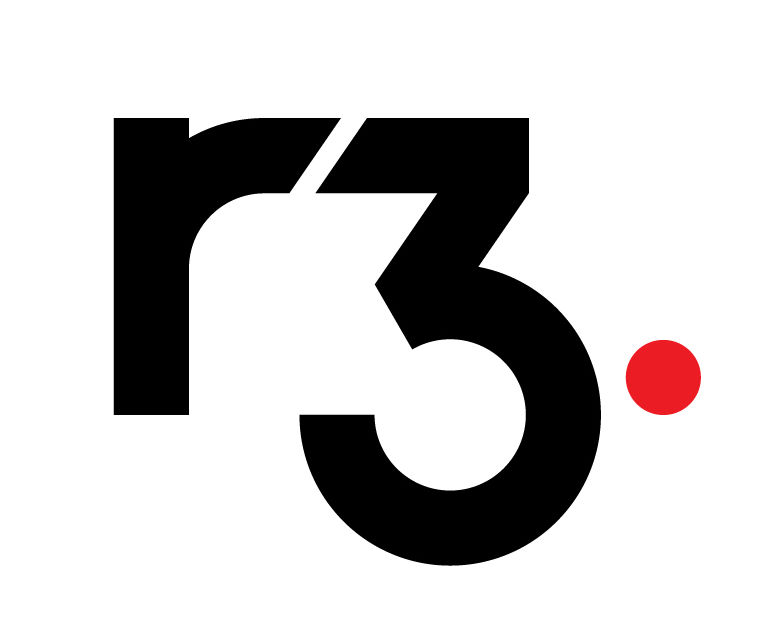
This episode is brought to you by our friends and sponsors at R3. In this digital-first world, now more than ever, businesses need to modernize existing processes, systems and models – and enterprise blockchain provides the ideal solution for transacting directly and streamlining business operation.
Developed by R3, Corda is light years ahead of other blockchain platforms in terms of privacy, security, scalability and interoperability. And–because Corda was built to meet the stringent requirements of highly-regulated industries, it can be used by firms of any type or size and in any industry.
Blockchain applications built on Corda can reimagine and increase the potential of existing business networks, enabling direct and trusted transactions that eliminate friction and accelerate growth.
Check out r3.com to find out more.
